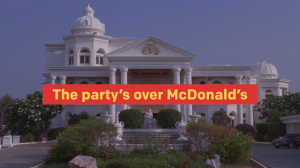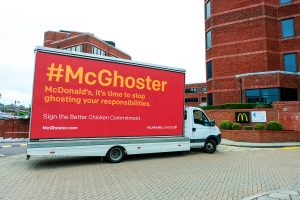McDonald’s is one of the biggest restaurant chains in the world with a net income over $5 Billion. Yet, as companies like Burger King, Subway, and Pret A Manger are making concrete and meaningful changes to chicken welfare, McDonald’s is lagging behind, releasing policies that won’t make the desperately needed improvements for animals.

Since McDonald’s continues to “ghost” their responsibilities to animal welfare, today, The Humane League is launching a global brand-jacking campaign that brings their commitment-phobia to light.
Created by independent creative agency Don’t Panic, #McGhoster aims to attract public attention towards McDonald’s failure to commit to meaningful improvements for chickens, creating a pressure group that’s impossible for them to ignore: their own consumers.
The campaign is being launched with a cross-platform online film, supported by a series of brand-jacking posters, ad vans and social posts to build momentum and encourage consumers to speak up. You can now even find definitions for #McGhoster on Wikipedia and Urban Dictionary. Viewers are then encouraged to sign the petition at McGhoster.com to apply pressure.

Under McDonald’s new ‘improved welfare’ policy, chickens raised and killed for its menu are still forcefully bred to grow so large and so fast that they can literally become immobilised under the weight of their own enormous bodies, often unable to stand or walk and left to lie in their own excrement.
The issue is so severe that if we, humans, grew at a rate similar to McDonald’s chickens, we would weigh 300kg (660lbs) at just two months old. Their chickens are also kept in overcrowded conditions that prevent them from behaving naturally. What’s more, eating meat from sick and debilitated chickens, raised within cramped and confined factory farms, can put humans at risk of contracting bacterial infections such as salmonella and campylobacter.
Taylor Ford, Director of Campaigns at The Humane League, said “What we’re asking for is perfectly reasonable and an essential part of McDonald’s ethical responsibilities. The commitment we are asking McDonald’s to sign simply addresses the very worst suffering endured by chickens. The changes we are proposing are supported by scientific evidence, backed by leading animal protection charities and have been adopted by over 130 companies in the US.”

Appointed Agency of Record by The Humane League in June 2019, this is the first piece of creative to come out of Don’t Panic’s partnership with the international non-profit. Produced by Object & Animal directors Matias Rygh & Mathias Eriksen, the launch film was shot in Thailand over one day. The film takes us through the aftermath of a debauched and scandalous party at the ‘McDonald’s Mansion’. As we are led from room to room, we hear angry voicemails from an array of people who believe they’ve been misled and ghosted by the host of the party.
The film is peppered with references to McDonald’s—from the iconic colourway, to a scattering of fries, to a number plate reading ‘B1G M4C’, and a set of pool noodles floating in the shape of the iconic golden arches. There’s also a not-so-subtle reference to the fast food giant’s CEO (when googling Steve Westerbrook, the results ask if you mean Steve Easterbrook’). The gags are offset by more serious nods to their mistreatment of chickens; a painting of a chicken slashed at the neck, an ice sculpture of a chicken melting in the sun and fake feathers eerily breezing through the house.

George McCallum, Senior Creative, Don’t Panic, said “Despite the fact that McDonald’s have cultivated a friendly and wholesome “I’m Lovin’ It” persona, they’ve been profiting from the inhumane treatment of chickens. We’ve set out to not only inform the public of this sobering fact, but to also let McDonald’s know that it can’t go on. It’s time for McDonald’s to stop ghosting their responsibilities and sign the Better Chicken Commitment (and the North American equivalent). In other words, the party’s over!”He added,“It was important for us to personify the reckless, vulgar and irresponsible way that McDonald’s has been acting—a party proved to be the perfect storytelling vehicle. To highlight how horrified consumers would be if they understood the bad behaviour and farming practices, we overlaid audio of angry voicemails from people that had been lied to, voicing dismay over the fact that those concerns had been ignored.”
Source: Don’t Panic

You must be logged in to post a comment Login